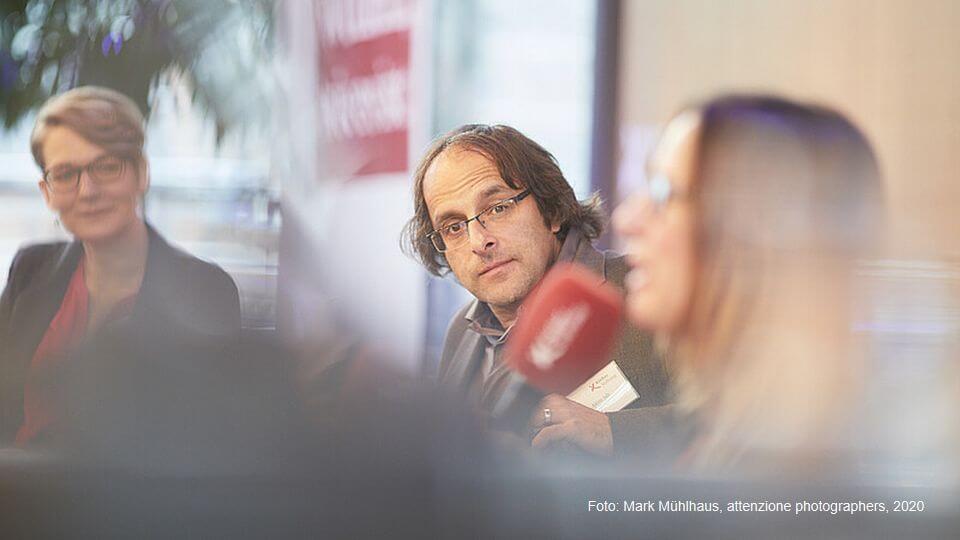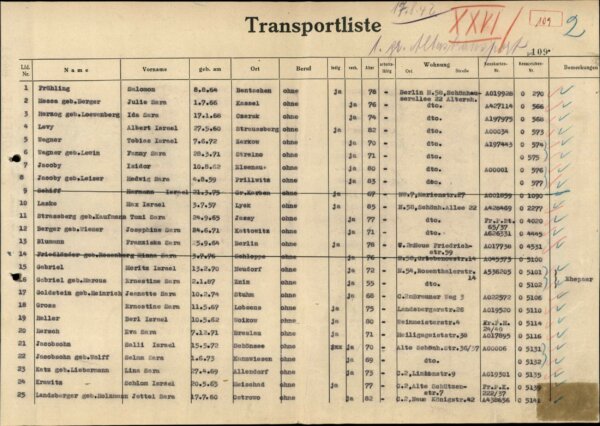“A surprisingly large number of open research questions”

The Arolsen Archives are organizing a scholarly conference on the subject of “Deportations in the Nazi era – Sources and Research” to be held in November 2020. In the following interview, Akim Jah, research associate in the Research & Education department and one of the event’s organizers, discusses the background, the current state of research, and the aims of this international conference.
How did deportations come to be the subject of the next major conference to be held by the Arolsen Archives?
One reason is certainly that it enables us to refer to sources from the Arolsen Archives that have been newly indexed and cataloged. A number of collections, including new scans of the Berlin transport lists and documents from the Jewish community in Leipzig, will be published shortly in the online archive of the Arolsen Archives during the run-up to the conference. They are now much better indexed and cataloged than before and this creates opportunities for new research projects.
I notice that the title makes explicit mention of sources as a topic. Why is that?
Well, the situation with regard to sources is very patchy and the same can be said of research itself. Comprehensive documentation exists for some transports, time periods, groups of people, and specific localities. For others, there is hardly any source material at all. Some sources – a large number of documents from our archive, for example, – can already be viewed online in digital form. However, other collections have not yet been systematically evaluated because they are kept in archives that are relatively unknown. We are very keen to put the spotlight on the body of source material and to put special emphasis on knowledge potential and on digital indexing and cataloging projects.
The body of source material available for further research is also disparate. Assembly camps and the forced participation of the Jewish communities are just two examples of issues that are worthy of mention here.
And what is the main focus of the conference concerning the research on deportations?
We are following up on the findings of a conference that was held last June. The Vienna Wiesenthal Institute for Holocaust Studies and the Austrian Academy of Sciences invited participants to explore deportations of the Jewish population in territories under Nazi control. This was the first conference to focus on the subject of deportations in some time. Incidentally, the organizers of that conference will be giving one of the keynote speeches and will summarize the results of the conference in June so that we can build on them.

Deportation list from Berlin.
And the conference in Vienna showed that there is still a need for further research?
Yes, it certainly did. In November, we would like to focus the debate on comparative and systematizing research. The research situation looks very different for individual countries, regions and cities. Up until now, there has been a dearth of comparative studies of deportations whose ultimate aim was murder and other National Socialist mass transports, such as those that followed the suppression of the Warsaw Uprising. Neither has there been a coherent presentation of deportations as a central pillar of the Nazi policy of persecution and extermination. We also see a lot of research potential in connection with the Porajmos, the National Socialist genocide of the Sinti and Roma. Deportations in connection with the Porajmos have received much less attention than deportations in connection with the Holocaust.
Is the increased attention now being paid to the subject of deportations restricted to academia?
No, the topic is very much in the public eye at present. And this is not only because of the commemorative plaques laid for victims of National Socialism that are known as “Stolpersteine” (stumbling blocks). And the increase in interest is not restricted to Germany. For example, things are also happening at the destination points of the deportations, even in the smaller places. Memorial sites are being created or are being developed further, and intensive research is being carried out. Seen from the perspective of integrated history, these places in the Baltic region or Belarus have close links with the deportations from the German Reich. When the transports from Berlin, Frankfurt, or Munich arrived in the ghettos, the local Jewish population was murdered. Such connections are seen more clearly today.
Back to the conference: The call for papers is now open. What kind of submissions are you hoping to receive?
As I mentioned before, we are interested in systematizing and comparative issues, not in regional studies. And we are also interested in systematizing presentations of sources and of indexing and cataloging projects. We would like to offer interesting thematic panels on selected focal points. The conference is aimed explicitly at archivists and scholars.
When is the deadline for applications?
Applications must be submitted by 30 April. Applications with panels are also welcome, i.e. with presentations that are related to each other.
Where will the conference take place?
The conference is being held at the training academy of the Deutsche Bahn AG, which is located in the former Kaiserbahnhof railway station in Potsdam. This is an interesting venue because of its relevance to the subject of the conference. We are also very grateful to the Deutsche Bahn AG for providing financial support which will enable us to reimburse travel and accommodation expenses to conference contributors.
Will the conference be documented?
Yes, contributions will be published in the conference proceedings.

